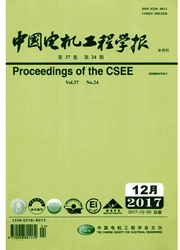

 中文摘要:
中文摘要:
热声发电机具有高效率、高可靠性且可利用低品位热能等突出优点,可望在太阳能发电和低品位热能回收等领域获得广泛应用。文中基于线性热声理论和直线发电机的简化模型对行波热声发电系统的输出性能进行了理论分析和计算,重点分析了机械谐振和电路谐振对于输出电功和效率的影响。设计并搭建了一个由行波热声发动机和单台直线发电机组成的热声发电系统。理论和实验均表明,机械谐振和电路谐振是行波热声发电系统获得良好性能的2个关键因素。以2.1MPa的氦气为工质,通过优化机械和电路阻抗使得系统达到谐振状态,该系统最终获得了191.1W的电功和7.15%的热电效率。
 英文摘要:
英文摘要:
Thermoacoustic electric generators have the advantages of high efficiency, high reliability, and capability of utilizing low-grade heat, showing a promising prospect in applications such as solar power generation showing a promising prospect thermal energy recovery, etc. Theoretical analysis and calculations were carried out to study the output performance of the system based on the linear thermoacoustic theory and the governing equations of a linear alternator. The effects of the mechanical and electrical resonances on the output electric power and the efficiency were analyzed. A thermoacoustic electric generation system composed of a traveling-wave thennoacoustic engine and a linear alternator was then designed and built to verify the theoretical analysis. Both the theoretical and the experimental results show that the mechanical and the electrical resonances are the key factors to achieve a good performance. By optimizing both the mechanical and the electrical impedances to be at resonant, 191.1 W electric power is obtained at a thermal-to-electric efficiency of 7.15% with helium of 2.1 MPa as the working gas.
 同期刊论文项目
同期刊论文项目
 同项目期刊论文
同项目期刊论文
 期刊信息
期刊信息
